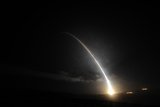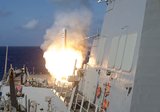China nixes US warship port visit, recalls admiral from US
China has pulled the plug on a US warship's scheduled visit to Hong Kong, and scrapped plans for a top admiral to meet with his US counterpart in Washington, officials said on 25 September.
The moves come as trade tensions soar between Beijing and Washington, which in the week of 24 September enacted new tariffs against China covering another $200 billion of its imports.
The USS Wasp, an amphibious assault ship, was due to visit Hong Kong in October 2018. Lieutenant Colonel David Eastburn, a Pentagon spokesman, said the Chinese had scrapped the visit.
Eastburn said: ‘The Chinese government did not approve a request for a US port visit to Hong Kong by the USS Wasp. We have a long track record of successful port visits to Hong Kong, and we expect that will continue.’
China's decision comes after Beijing recalled a top admiral who was visiting the US.
A US defense official told AFP that Vice Admiral Shen Jinlong, who commands the People's Liberation Army Navy, attended a naval symposium in Rhode Island in the week of 17 September.
Following the event, he was planning a visit to Washington that would have included meetings at the Pentagon with his US counterpart, Chief of Naval Operations Admiral John Richardson.
Eastburn said: ‘We were informed that Vice Admiral Shen Jinlong has been recalled to China and won't conduct a visit with Admiral Richardson.’
In the week of 17 September, Washington placed financial sanctions on the Equipment Development Department of the Chinese Defence Ministry, and its top administrator, for its recent purchase of Russian Sukhoi Su-35 fighter jets and S-400 surface-to-air missile systems.
Beijing responded by summoning the US ambassador to China, Terry Branstad, to lodge an official protest, while the Chinese military expressed ‘strong indignation and resolute opposition’ to the sanctions.
United in their resentment of America's global influence, China and Russia have sought in recent years to tighten up their ties and this month conducted weeklong joint military drills in Moscow's largest ever war games.
Further inflaming tensions, the US State Department said on 24 September that it was set to approve a $330 million sale of military aviation parts to the self-governing island of Taiwan.
Beijing sees Taiwan as part of its territory awaiting unification, and is deeply suspicious of the island's relations with the US.
China expressed ‘strong dissatisfaction’ on 25 September over the planned sale and urged Washington scrap the contract.
Beijing has been incensed by recent warming ties between Washington and Taipei, including the State Department's approval of a preliminary license to sell submarine technology to the island.
More from Defence Notes
-
![US lawmakers warn that “more military spending is absolutely necessary” to ensure Pentagon’s readiness]()
US lawmakers warn that “more military spending is absolutely necessary” to ensure Pentagon’s readiness
The US Congress has raised concerns about how inflation rates and cuts in main acquisition programmes could affect the US military.
-
![Can the US overcome Russian and Chinese nuclear capabilities?]()
Can the US overcome Russian and Chinese nuclear capabilities?
Washington’s ageing inventory and the pace Moscow and Beijing have been modernising their capabilities put in check the US Nuclear deterrence.
-
![US FY2024 funding package passes as China closes military capability gap]()
US FY2024 funding package passes as China closes military capability gap
The Pentagon has been operating under temporary funding since October 2023, which has impacted its main acquisition and development programmes, increasing the capability gap between the US and China.
-
![NATO outlines future challenges as Ukrainian funding from US stalls]()
NATO outlines future challenges as Ukrainian funding from US stalls
In 2023, defence spending increased by an unprecedented 11% across European NATO countries and Canada. Since 2014, the group has spent an additional US$600 billion on defence.
-
![US Pentagon to reduce investments in main acquisition programmes over FY2025]()
US Pentagon to reduce investments in main acquisition programmes over FY2025
The DoD requested nearly US$850 billion to fund operations over the next fiscal year. Despite the amount being 1% higher than the FY2024 budget request, it has not covered the 3% inflation rate, which could impact the DoD’s main programmes in the medium and long term.























